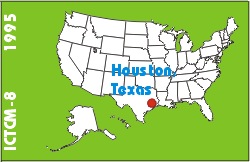
Electronic Proceedings of the Eighth Annual International Conference on Technology in Collegiate MathematicsHouston, Texas, November 16-19, 1995Paper C059Paradigm Lost: A Modern Approach to Teaching Ordinary Differential Equations |
Thomas G. WanglerIllinois Benedictine College 5700 College Road Lisle, IL 60532-0900 USA Phone: (708) 829-6554 Fax: (708) 960-1126 wangler@eagle.ibc.edu list of all papers by this author |
| Click to access this paper: |
ABSTRACT
Differential Equations has traditionally been taught as a 'methods' course. Different types of differential equations are discussed along with the method of obtaining their solution. The student is then left to work through the concomitant details of this new method; at this point they usually experience first-hand, the truthfulness of the old adage, 'the devil is in the details'. These diabolical details can involve lengthy algebraic manipulations, a healthy dose of differential calculus, and of course, the correct order of execution of the new technique. All in all, this can be a daunting task fraught with peril for the unwary student. As a result, it does little to pique the interest or curiosity of most students.In order to counter this undesirable state of affairs and make the course more interesting and less daunting for the students, I've adopted a new pedagogical paradigm. The new paradigm de- emphasizes (but does not eliminate) methods, and emphasizes (1) mathematical modeling, (2) analysis of the o.d.e., and (3) addressing the qualitative behavior of the solution. I earnestly endeavored to effect this paradigm shift without emasculating the course or making any major contributions to the 'dumbing down of America'!
In this talk I will discuss a variety of things ranging from my basic teaching philosophy to the prodigious amount of work involved in incorporating a computer lab component into a course. Some of the topics I'll touch on are given below.
- teaching philosophy and course objectives
- different media used in class
- how to incorporate a lab experience into a course and its impact on the course
- how the students respond to the way o.d.e.'s is taught
- introducing contemporary topics into the course
- student talks on d.e. topics at a local student symposium
- giving the class 'real life' applications involving soluble differential equations
- old paradigm/new paradigm--- a contrast
- why bother using computer technology?
- good news/bad news
- what's so hard about creating a good lab
Keyword(s): differential equations, software
